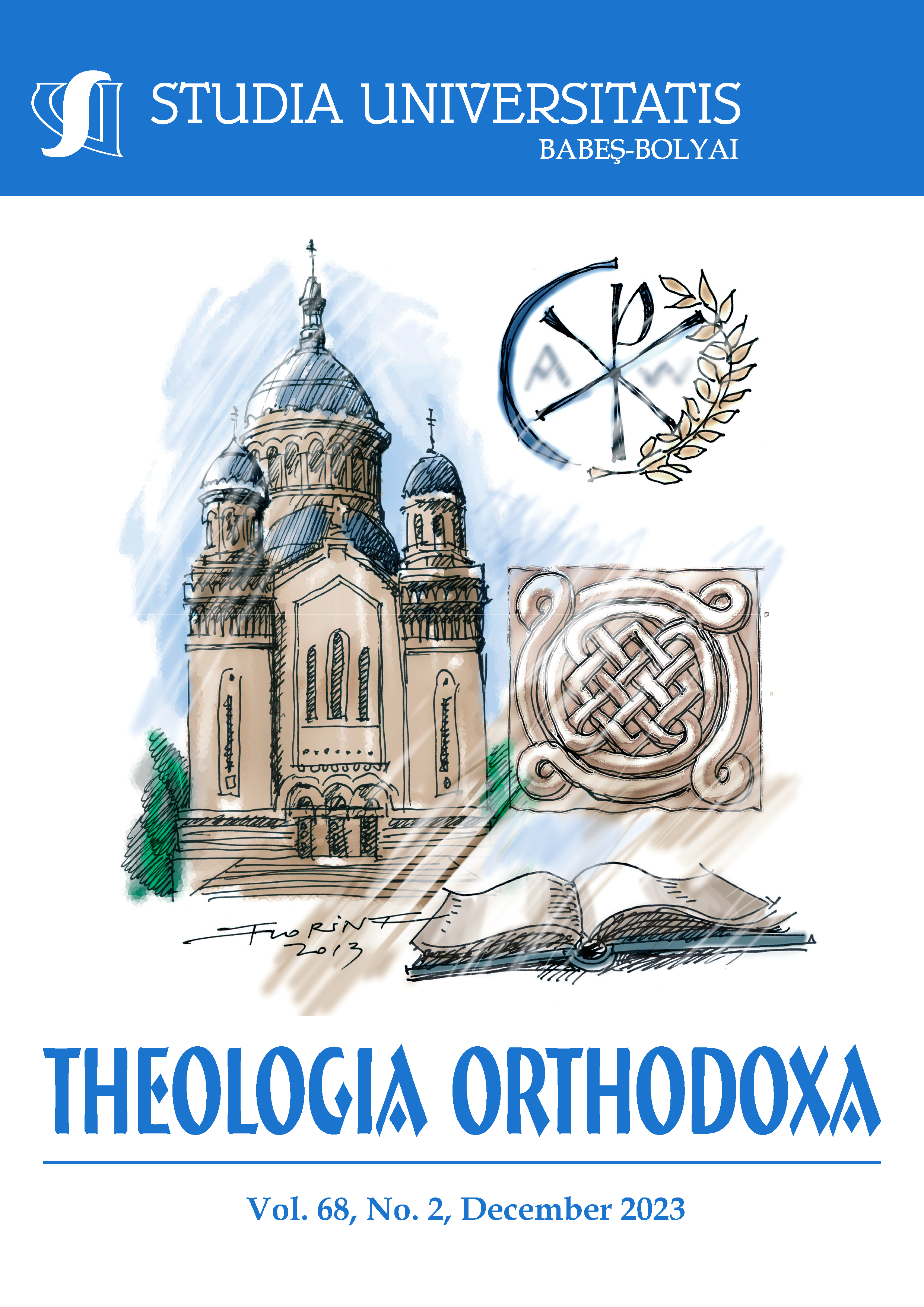Criteria at the Last Judgment from Matthew 25:14-46
DOI:
https://doi.org/10.24193/subbto.2023.2.05Keywords:
Eschatology, Judgment, Parable of the Talents, Parable of the Last Judgment, Christians, Non-Christians, exegesis, ethnos, criteriaAbstract
This study analyses the criteria for judgment presented in the Parable of the Talents (Mt 25:14-30) and the Parable of the Last Judgment (Mt 25:31-46) in the Gospel of Matthew. It explores whether these parables refer to the criteria for judgment of Christians and non-Christians, respectively. After providing background on eschatology and judgment in Scripture, the study examines the usage of key Greek words like “ethnos” (nation) and “adelphos” (brother) to support the interpretation that the Last Judgment passage refers to non-Christians. It highlights exegetical difficulties in viewing this as a judgment of “unconscious Christians” and proposes that non-Christians are judged based on acts of mercy towards Christ's disciples. In contrast, the Talents parable is presented as outlining the criteria for judgment of Christians – namely, their use of God-given gifts and abilities to serve others. So, while non-Christians are judged by how they care for Christ's followers, Christians face judgment for how well they use their unique gifts. Together these parables present a complex picture of the diverse criteria, for both Christians and non-Christians, at the final judgment.References
Albricht, W.F. and C.S. Mann, Matthew. New York: Doubleday & Company, 1971.
Bauckham, R.J. “Eshatologie.” In Dicționar Biblic. Translated by Liviu Pup and John Tipei. Edited by J.D. Douglas. Oradea: Cartea Creștină, 1995.
Bauer, Walter. Griechisch-Deutsches Wörterbuch zu den Schriften des Neuen Testament. Berlin: Alfred Töpelmann Verlag, 1963.
Bitenhard, Hans. “e;qnoj.” In Theologisches Begriffslexikon zum Neuen Testament, Band III. Wuppertal: Theologischer Verlag Rolf Brockhaus, 31972.
Brie, Ioan. Dicționar de Teologie Ortodoxă. București: IBMO, 1994.
David Sim, C. Apocalyptic Eschatology in the Gospel of Mattew. Cambridge: University Press, 1996.
Gundry, Robert H. Matthew. Grand Rapids, MI: William B. Eerdmans Publishing Company, 1994.
Hagner, Donald A. Matthew 14-28. Vol. 33b. Dallas, Te: Word Books Publisher, 1995.
Ică. Ioan I. jr. Canonul Ortodoxiei, vol. 1 Canonul apostolic al primelor secole. Sibiu: Deisis/Stavropoleos, 2008.
Luck, Urlich. Das Evangelium nach Matthäus. Zürich: Theologischer Verlag, 1992.
Luz, Urlich. The Theology of the Gospel of Matthew. Translated by Bradford Robinson. Cambridge: University Press, 1998.
Maier, Gerhard. Evanghelia după Ioan. Vol. 6-7. Korntal: Lumina lumii, 1999.
Maier, Gerhard. Evanghelia după Matei, vol. 1-2. Krontal: Lumina Lumii, 2000.
Milne, B.A. “Judecată.” In Dicționar Biblic. Translated by Liviu Pup and John Tipei. Edited by J.D. Douglas. Oradea: Cartea Creștină, 1995.
Neudrfer, Heinz-Werner. Faptele Apostolilor. Vol. 8-9. Korntal: Ed. Lumina lumii, 2000.
Papacostas, Serafim. Parabolele Domnului. Translated by Teodosia Zorica Lațcu and Serafim Popescu. Cluj-Napoca: Renașterea, 2022.
Pașca-Tușa, Stelian. “God's Mercy or Jonah's Anger? An Orthodox Approach to the Case of Nineveh.” Studia Universitatis Babes-Bolyai – Theologia Orthodoxa 1 (2020): 23-37.
Pașca-Tușa, Stelian. “Trupul morții și al slavei – perspectivă biblică și bioetică.” Studia Universitatis Babeş-Bolyai – Bioethica 2 (2013): 67-86.
Pașca-Tușa, Stelian. “Dreptatea lui Dumnezeu în contextul psalmic al invocării milei divine.” In Dreptate și comportament: cercetări biblice, 101-120. Edited by Hans Klein, Ion Brie and Constantin Oancea. Sibiu: Astra Museum, 2015.
Paşca-Tuşa, Stelian, Paula Bud and Elena Oneţiu. “The Mystery of Alterity reflected in Christian Teachings (Învăţături hristianiceşti) (1700).” Philobiblon. Transylvanian Journal of Multidisciplinary Research in Humanities 25.2 (2020): 305-320.
Rahner, Karl. Die anonymen Christen, in Karl Rahner, Schriften zur Theologie, Bd. VI. Einsiedeln, 1965.
Schnackenburg, Rudolf. Matthäusevangelium 16,21-28,20. Würzburg: Echter Verlag, 1987.
Sf. Ioan Gură de Aur. Comentar la Evanghelia de la Ioan. Oradea: Ed. Pelerinul Român, 2005.
Sf. Ioan Gură de Aur. Comentariu la Epistola întâi către Tesaloniceni. Translated by Izabela Grigoraș. București: IBMO, 2022.
Sf. Ioan Gură de Aur. Omilii la Matei. In Părinți și Scriitori Bisericești. Vol. 23. Translated by Dumitru Fecioru. Bucureşti: IBMO, 1994.
Sf. Teofilact al Bulgariei. Tâlcuirea Epistolelor către Tesaloniceni, Timotei, Tit și Filimon. Translated by Florin Stuparu. București: Sophia, 2019.
Sf. Teofilact al Bulgariei. Tâlcuirea Sfintei Evanghelii de la Matei. București: Sophia, 2007.
Stăniloae, Dumitru. Teologia Dogmatică Ortodoxă, vol. 3. Bucureşti: IBMO, 1997.
Tofană, Stelian. Evanghelia lui Iisus – Misiunea cuvântului. Cluj-Napoca: Mega, 22018.
Vild, Marian. Eshatologia Paulină. București: Ed. Universtății, 2017.
Downloads
Published
How to Cite
Issue
Section
License
Copyright (c) 2023 Studia Universitatis Babeș-Bolyai Theologia Orthodoxa

This work is licensed under a Creative Commons Attribution-NonCommercial-NoDerivatives 4.0 International License.





 ISSN (print): 1224-0869, ISSN (online): 2065-9474, ISSN-L: 2065-9474
ISSN (print): 1224-0869, ISSN (online): 2065-9474, ISSN-L: 2065-9474